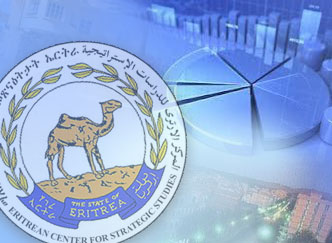April 14, 2018
Multiple Standards that Harbor Subversion of the Rule of Law

April 13, 2002, is a date on which the Eritrea-Ethiopia Boundary Commission (EEBC), a neutral Boundary Commission set up to arbitrate the border dispute between Eritrea and Ethiopia, gave its final and binding verdict. Nine years have passed since the adjudication of the Boundary Commission’s ruling. Compliant with The Algiers Agreement and the modus operandi set by the Boundary Commission, the border dispute of the two countries should have, once and for all, been settled through delimitation and physical demarcation on the ground up to November 2003 as per the EEBC’s ruling. As the TPLF is commanded by its lords to quibble the rule of law, the decision, hindered from implementation, has thus far ensued unparalleled aftermath and waste of time. The Boundary Commission, whose mandate to implement the delimitation decision as planned was held back with a series of obstructive actions, officially announced that it concluded its mandate in the end of November 2007 by declaring the border virtually demarcated by the coordinates it had issued a year earlier.
April 13, 2002, is a date on which the Eritrea-Ethiopia Boundary Commission (EEBC), a neutral Boundary Commission set up to arbitrate the border dispute between Eritrea and Ethiopia, gave its final and binding verdict. Nine years have passed since the adjudication of the Boundary Commission’s ruling. Compliant with The Algiers Agreement and the modus operandi set by the Boundary Commission, the border dispute of the two countries should have, once and for all, been settled through delimitation and physical demarcation on the ground up to November 2003 as per the EEBC’s ruling.
As the TPLF is commanded by its lords to quibble the rule of law, the decision, hindered from implementation, has thus far ensued unparalleled aftermath and waste of time. The Boundary Commission, whose mandate to implement the delimitation decision as planned was held back with a series of obstructive actions, officially announced that it concluded its mandate in the end of November 2007 by declaring the border virtually demarcated by the coordinates it had issued a year earlier.
In its 16th report to the United Nations, the Eritrea-Ethiopia Boundary Commission wrote: “Ethiopia is not prepared to allow demarcation to continue in the manner laid down in the Demarcation Directions and in accordance with the timeline set by the Commission. … Ethiopia proposes that “an alternative mechanism to demarcate the contested parts of the boundary” be set up. Such an alternative mechanism would involve a departure from, and thus an amendment to, the terms of Article 4.2 of the Algiers Agreement, which gives the Commission the mandate to demarcate the boundary. Moreover, Ethiopia’s reference to “the contested boundary” can only be understood as a reference to those parts of the boundary to which it alone and unilaterally takes exception: no part of the boundary is “contested” by both Parties.”
Despite the United Nations, a linchpin that assumed responsibility as a guarantor and witness of the Algiers Agreement, is to blame for the complications created in the implementation process of the EEBC’s mandate and the resulting repercussions in the peoples of Ethiopia and Eritrea, the US Administration, which is using the UN as an instrument, is primarily answerable to the role Washington played at short-circuiting the implementation of the demarcation for reasons it is well aware of. This fact is endorsed by John Bolton, former US Ambassador to the UN. John Bolton recounts in his book entitled “Surrender is not an Option” how a US initiative to render the Algiers Agreement useless was being forwarded by the Department of State and pushed in the UN Security Council. “For reasons I never understood, however, [Jendayi] Frazer [then Assistant Secretary for Africa] reversed course, and asked in early February [2005] to reopen the 2002 EEBC decision, which she had concluded was wrong, and award a major piece of disputed territory to Ethiopia. I was at a loss how to explain that to the Security Council, so I didn’t, simply asking in February for another thirty-day extension of the UNMEE status quo while the “U.S. initiative” continued.”
Information the online group WikiLeaks recently released only reaffirmed the fact the people of Eritrea is already mindful of. It further points out that at a meeting the representatives of the US, Britain, France, Germany, Italy and Sweden held in November 2009, the US representative, beyond stating Ethiopia is unrivaled ally of the US in East Africa, underscored that this same administration would want to sustain the border dispute at a standstill. Even though these facts count upon official documents of the US, the Administration in Washington has been forwarding tremendous military, economic, political and diplomatic nurturing to the subservient regime that has been trampling on the rule of law at its bidding. The UN ecurity Council, more often than not, imposed sanctions unabashedly on Eritrea at the behest of the US for questioning the rule of law and international legal instruments. The Administration has also encouraged the clique to crack popular uprising through meddling in Ethiopia’s internal affairs.
Accounts of the past nine years recount in a nutshell utter failure of the parties, especially the United States, indulged in flagrant violation of international laws and charters on multiple standards for geo-political interests through engaging in vicious cycles of subversion of the rule of law. Still, intensive political nurturing for the subversion of the rule of law is yet in effect. Running forward until when? There is a grand message to convey on the occasion of the ninth anniversary of the EEBC’s ruling. Whatsoever the case, the border dispute between Eritrea and Ethiopia is now a forgone conclusion, and thus, it is imperative that Eritrea’s flag, high over the sovereign territory, shall be raised on the unbreakable pillar of truth.
Shabait 12 April 2011



